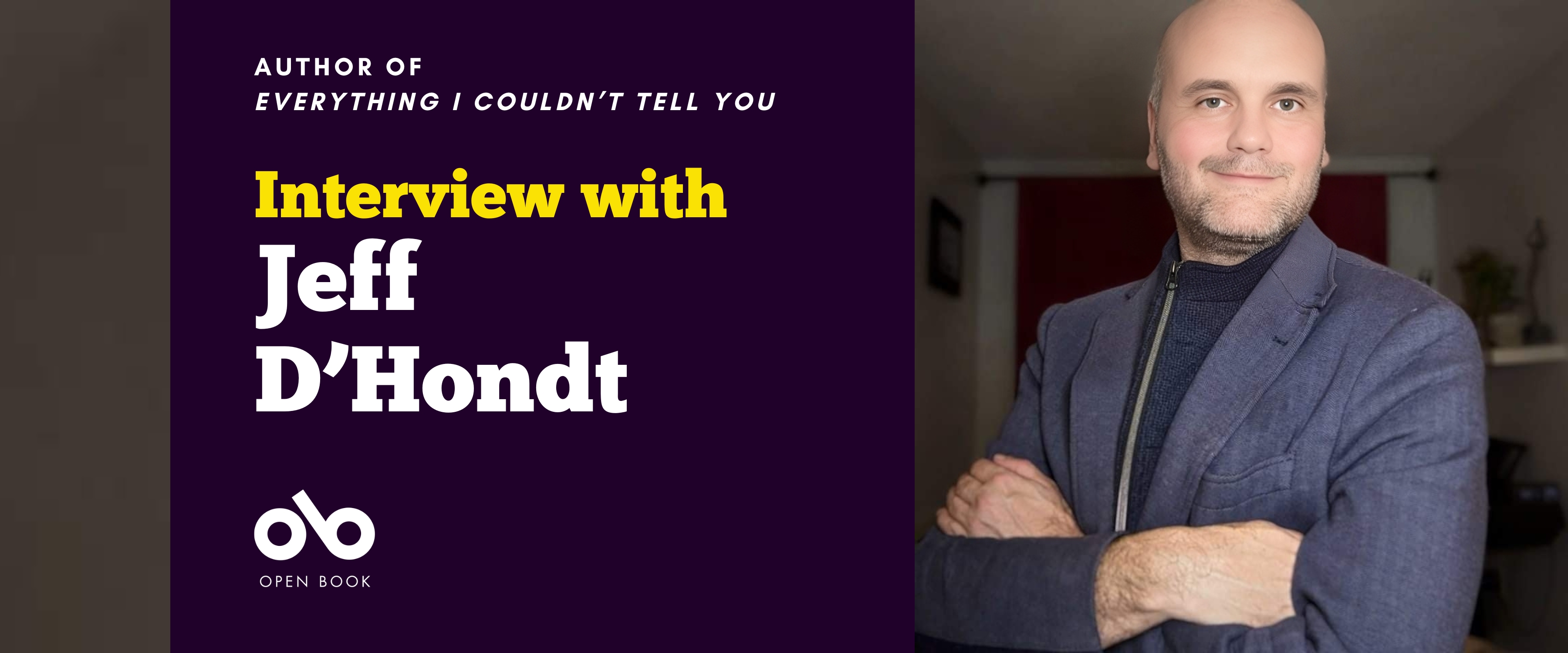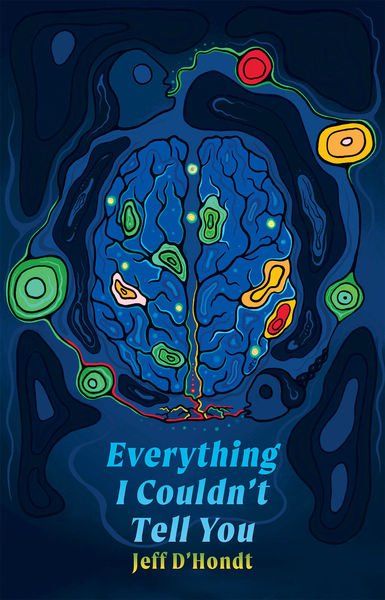Playwright Jeff D'Hondt On Facing the Truth About a Life Quietly Falling Apart, and Learning How to Heal
After being revived from a coma, Megan lives with traumatic injuries that spur her on to violence. Her physician seeks outside help, finding an Indigenous clinician to treat Megan and to seek innovative ways of healing. They learn that speaking Lenape, their shared and almost extinct language, can yield profound rehabilitative effects. But, this also triggers Megan, and sets her on a path that endangers her life.
In his new play, Everything I Couldn’t Tell You (Playwrights Canada Press), Jeff D'Hondt draws from his own experience in facing personal suffering and distress to tell an important story about discovery and healing. It's a powerful story centered around the life-changing lesson that pain is often unjust, but it also reminds us that we’re alive.
Read more about the play and how it came to be in this Behind the Curtain Interview, which we're excited to share today on Open Book.
Open Book:
How did this play first come to life for you? Do you remember the first bit of writing you did for it?
Jeff D'Hondt:
The preface included with the play details much of the journey that brought Everything I Couldn’t Tell You to life; I can expand on those words here. I remember every stage of early writing. From 2010-2011, I wrote a few awful drafts of an untitled play about a scientist trying to improve the treatment of head injuries. The less I say about that nonsense the better. I abandoned the project. Fast forward several years. I was in Vancouver for their Fringe Festival, where my debut stage play, A False Face (now Mesingw) was produced. I was walking on the Lions Gate bridge with a friend. When we reached the middle of the bridge, I debated jumping. It was a split second thought I share carefully today – too many people have acted on that horrifying decision. I mustn’t diminish pain that profound. In my case, I hadn’t had a suicidal thought in decades. I was stunned it came to me. My friend asked me if I was okay, noticing my sudden tension.
Words poured out of me, words I never thought I’d say. I finally admitted my near perfect life was coming apart – until that point, I had no idea I was that miserable. “I had no idea.” That’s the lie I almost told my friend. I’d secretly hated my life for years, so secretly I only let my pain become visible as an unexpected panic attack. Desperate in the presence of my friend, I finally admitted my lies were killing me. In that same moment, three other thoughts came to me. One was the new title of my abandoned play, Everything I Couldn’t Tell You. The second was the final scene, which came to me pretty much as written in the published text. And the third was a demand from my ancestors: never, ever harm yourself. Finish this play. I finished my walk with my friend and started writing that night, tears in my eyes, realizing how much healing I had yet to do. Five years later, the play was produced. My healing has not ended. I continue that work, as difficult as it’s been.
OB:
Was there a question you were exploring in this work, and if so, did you know what it was when you started writing?
JDH:
One question drove the entire text, from the beginning: “What happens when you feel emotional pain so intense it defies language?” There was plenty I couldn’t say as the play was written from 2013-2018. Words failed me in two languages: English and Lenape. In the case of Lenape, I massacred the language the moment it reached my lips – to this day, there’s no hope of me having any sort of conversation with a true speaker. However, every attempt to speak it felt cleansing. My brain changed, even by puzzling through a word; I found it easier to quell my daily anxieties. As much as I wanted to express how that relief felt in my original language, there were no words to speak because that medicine hadn’t fully reached me. In the case of English, I sat with Elders and healers who blessed me with guidance and ceremonies. I went to psychotherapy to deal with turmoil those ceremonies could not. I told my mother and friends I loved them. I told everyone as much as I could about my emotional state. But words failed me, every time. Some thoughts were too painful to express. Others were stunning, overwhelming in the best way possible. And here I am, still trying to find words.
Here’s my latest attempt: As a child, my family travelled to Jasper, Alberta. My dad and I went for a mountain hike. At a certain point, all we could see was other mountains. I asked my dad a question I can’t remember. Something like “Dad, is this where God lives?” forgetting that he was a staunch atheist. He cried happy tears and smiled, silent for at least another five minutes, perhaps suggesting in his own way this was a secular heaven. That particular experience didn’t influence the script. Yet it illustrates lessons other more private moments had on me, as I pondered the central question of the text. Some experiences lose everything if they’re described. They might be beautiful, like a mountain. They might be awful, like the hell of my life as the script was written. But those unuttered feelings become unspoken parts of us, changing us tangibly. Thus, the script features multiple moments where silence comes to life as inexplicable behaviours, non-lyrical music, incomplete memories, abstract visual art, brain scans and implied emotions. These moments are medicine that would no longer be medicine if words described them.
Your CanLit News
Subscribe to Open Book’s newsletter to get local book events, literary content, writing tips, and more in your inbox
OB:
What drew you to the setting of your play and how did you go about creating it?
JDH:
I’ve been a social worker for decades, much of which has been spent working in hospitals. There are plenty of medical dramas floating around, on stage and on screen, but few are about Indigenous physicians. I’ve met many such doctors in my career and wanted to see one on stage – their blending of Western biomedicine and Indigenous teachings has long inspired me. I also wanted to explore some of the potential neurological impacts of learning Indigenous language, so I started doing research into things like gaze interfaces, medical imaging, and neurological medicine. A few drafts later, Dr. Alison Montour (originally Alison Brant) was born, along with Castle Dawn General Hospital.
OB:
Which of your characters do you feel most connected to in this work, and why?
JDH:
Megan’s feral outbursts, epic smart-assery, and drive to heal whatever the cost have always lit me up. If she were real, I’d be terrified she’d kick my ass. But onstage – wow, she says exactly what I’d never be able to say. My loved ones might guess I’d feel more connected to Alison. Indeed, her use of art to heal others, her commitment to her work, her connections to her community and language are all qualities I admire. And I can’t leave Cassandra out of the mix. In early drafts, I hated her so much I almost cut her out. She seemed too much like a colleague I’ve despised for most of my career. But as I fleshed her out, she ended up the focus of two of my favourite moments in the text. In one, she meets her future wife (despite flirting as awkwardly as I do). In the other, she’s meeting with her therapist. Cassandra remarks that her deceased wife’s head once fit in her hand. And that her partner smiled as Cassandra stroked her hair. That line hits me, hard, each time I read or hear it. I can’t choose between these women – each speaks to a different part of me. Never ask me to pick my favourite child!
OB:
Are there other playwrights that you’ve been inspired by? What qualities in their work are you most drawn to?
JDH:
Playwrights of all stripes inspire me because it’s so difficult to write anything remotely good, despite the long list of people I’m noting here: Hannah Moscovitch, Brad Fraser, John Mighton, Caryl Churchill, Tara Beagan, Sam Shepherd, Tracy Letts, Kat Sandler, Keith Barker, Kevin Loring and Frances Končan. I’d name dozens of other writers if I answered the same question tomorrow but there are commonalities that draw me to them. Satirical wit creates an instant endorphin rush. I admire the courage to let characters speak their minds, especially if those words challenge an audience. An ability to find both the ridiculous and humanity within even the darkest of characters, ‘beautiful assholes’ as Hannah Moscovitch calls them, blows my mind. A smaller group of writers, like Mighton, draw on scientific and mathematical concepts to guide the themes of their texts – that quality almost always impresses me.
____________________________________________
Jeff D’Hondt is a member of the Lenape nation at the Six Nations of the Grand River with additional Belgian Canadian ancestry. He has two decades of experience working in mental health and substance abuse treatment services, which he gained through positions in the correctional system, the Ontario Ministry of Health and Long-Term Care, within Indigenous communities, and at hospitals and homeless shelters. He graduated from the University of Toronto with an Honours Bachelor of Arts in History (with minors in Aboriginal Studies and the History of Science), from Toronto Metropolitan University with a Bachelor of Social Work (where he was also part of the contract teaching faculty), and from York University with a Masters of Social Work (where his research on using theatre to give voice to homeless Indigenous youth was awarded the Gerry Erickson Essay Prize for Best Practice Research Paper). He’s also a K.M. Hunter Artist Award nominee who has written plays produced/workshopped in Toronto, Vancouver, and Los Angeles. He lives in Toronto.





